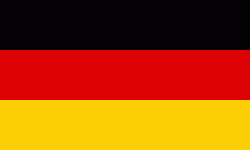Weimar (Kreisfreie Stadt Weimar)
Weimar is a city in the state of Thuringia, Germany. It is located in Central Germany between Erfurt in the west and Jena in the east, approximately 80 km southwest of Leipzig, 170 km north of Nuremberg and 170 km west of Dresden. Together with the neighbouring cities of Erfurt and Jena, it forms the central metropolitan area of Thuringia, with approximately 500,000 inhabitants. The city itself has a population of 65,000. Weimar is well known because of its large cultural heritage and its importance in German history.
The city was a focal point of the German Enlightenment and home of the leading figures of the literary genre of Weimar Classicism, writers Johann Wolfgang von Goethe and Friedrich Schiller. In the 19th century, noted composers such as Franz Liszt made Weimar a music centre. Later, artists and architects such as Henry van de Velde, Wassily Kandinsky, Paul Klee, Lyonel Feininger, and Walter Gropius came to the city and founded the Bauhaus movement, the most important German design school of the interwar period.
The political history of 20th-century Weimar was volatile: it was the place where Germany's first democratic constitution was signed after the First World War, giving its name to the Weimar Republic period in German politics (1918–33). It was also one of the cities mythologized by National Socialist propaganda.
Until 1948, Weimar was the capital of Thuringia. Many places in the city centre have been designated as UNESCO World Heritage Sites, either as part of the Classical Weimar complex (containing monuments to the classical period of Weimar in 18th and 19th centuries) or the Bauhaus complex (containing buildings associated with the Bauhaus art school). Heritage tourism is one of the leading economic sectors of Weimar.
Noted institutions in Weimar are the Bauhaus University, the Liszt School of Music, the Duchess Anna Amalia Library, and two leading courts of Thuringia (the Supreme Administrative Court and Constitutional Court). In 1999, Weimar was the European Capital of Culture.
The city was a focal point of the German Enlightenment and home of the leading figures of the literary genre of Weimar Classicism, writers Johann Wolfgang von Goethe and Friedrich Schiller. In the 19th century, noted composers such as Franz Liszt made Weimar a music centre. Later, artists and architects such as Henry van de Velde, Wassily Kandinsky, Paul Klee, Lyonel Feininger, and Walter Gropius came to the city and founded the Bauhaus movement, the most important German design school of the interwar period.
The political history of 20th-century Weimar was volatile: it was the place where Germany's first democratic constitution was signed after the First World War, giving its name to the Weimar Republic period in German politics (1918–33). It was also one of the cities mythologized by National Socialist propaganda.
Until 1948, Weimar was the capital of Thuringia. Many places in the city centre have been designated as UNESCO World Heritage Sites, either as part of the Classical Weimar complex (containing monuments to the classical period of Weimar in 18th and 19th centuries) or the Bauhaus complex (containing buildings associated with the Bauhaus art school). Heritage tourism is one of the leading economic sectors of Weimar.
Noted institutions in Weimar are the Bauhaus University, the Liszt School of Music, the Duchess Anna Amalia Library, and two leading courts of Thuringia (the Supreme Administrative Court and Constitutional Court). In 1999, Weimar was the European Capital of Culture.
Map - Weimar (Kreisfreie Stadt Weimar)
Map
Country - Germany
 |
 |
| Flag of Germany | |
Various Germanic tribes have inhabited the northern parts of modern Germany since classical antiquity. A region named Germania was documented before AD 100. In 962, the Kingdom of Germany formed the bulk of the Holy Roman Empire. During the 16th century, northern German regions became the centre of the Protestant Reformation. Following the Napoleonic Wars and the dissolution of the Holy Roman Empire in 1806, the German Confederation was formed in 1815.
Currency / Language
| ISO | Currency | Symbol | Significant figures |
|---|---|---|---|
| EUR | Euro | € | 2 |
| ISO | Language |
|---|---|
| DE | German language |















